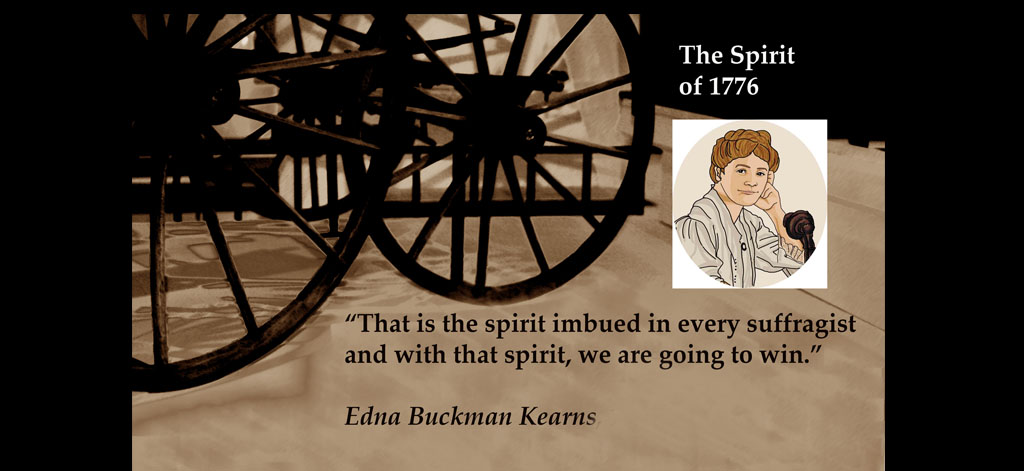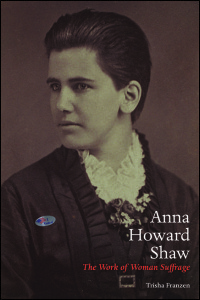 EDITOR’S NOTE: Playwright Daphne White has completed a play entitled, “And Yet We Persist,” a work of historical fiction exploring the internal battles of the early women’s rights movement. Her point of view highlights the controversies then that still elicit debate today. The early activists produced numerous plays, art, poetry, novels, and other expressions to parallel the creative output planned for 2020. White seeks venues for the play’s production.
EDITOR’S NOTE: Playwright Daphne White has completed a play entitled, “And Yet We Persist,” a work of historical fiction exploring the internal battles of the early women’s rights movement. Her point of view highlights the controversies then that still elicit debate today. The early activists produced numerous plays, art, poetry, novels, and other expressions to parallel the creative output planned for 2020. White seeks venues for the play’s production.
by Daphne White
The suffragists were well aware that well-behaved women don’t make history. They also understood that women who make history are often treated poorly by historians. So the early suffragists took care to write their own stories, and craft well-polished personas.
But what were Susan B. Anthony and Elizabeth Cady Stanton really like? And how did these two staunch abolitionists end up allies with George Francis Train, a Trump-like racist? A new, full-length play explores these questions and many more.
And Yet We Persist is a no-holds-barred exploration of the epic battles, lies and betrayals that took place between the early suffragists and the male power brokers of their time. And in a brief flash-forward to the present, the play also asks—how much has really changed in the power dynamic between men and women?
And Yet We Persist is a finalist in the 2020 Julie Harris Playwright Award Competition, and it is available for readings and productions during the 2020 suffrage centennial.
While the play is a work of historical fiction, it is based on two years of painstaking research. Some of the scenes are taken from condensed transcripts of actual events — Sojourner Truth’s “Ain’t I a Woman” speech; Stanton’s appeal to the New York State constitutional committee; the contentious 1869 American Equal Rights Association meeting; and Anthony’s 1873 “voting while female” trial. But other scenes are imagined, showing highly personal interactions that were never recorded.
In addition to well-known figures such as Sojourner Truth, Lucy Stone and Frederick Douglass, the play introduces Phoebe Harris Phellps, the abused wife of a famous Boston abolitionist and state Senator. Phellps was a “fugitive wife” who approached Anthony for help after her husband imprisoned her in a mental institution for two years. The play also explores Anthony’s little-known relationship with Anna Dickinson, one of the most famous lecturers of her day, who was known as “America’s Joan of Arc.”
And then there is George Francis Train, the man on whom Jules Verne based Around the World in 80 Days. Like our current president, Train was a millionaire businessman with no political experience who decided to run for president. He was also willing to support the suffragists at a time when they had absolutely no money, and no other way of getting it. But Train’s financial support required the women to share a stage with a man who opposed black suffrage. That episode, and others, resulted in a split in the suffrage movement that lasted for decades, with Anthony and Stanton on one side and Stone and her New England contingent on the other.
Frederick Douglass had a complicated and contentious history with Anthony, and this is also explored in the play. Douglass was no fan of Sojourner Truth, either, and she had her own issues with Douglass. Everything was fraught; nothing was simple or straightforward. This story is both messy, and eerily contemporary. Like today’s women, the suffragists were forced to make difficult decisions under incredibly harsh conditions. They were far from perfect, yet they never looked back, and they rarely apologized.
“Failure is impossible,” Anthony said in her last public speech. Yet she knew, even as she lay dying, that she would not see success in her lifetime. And as the play suggests in its last few minutes, more than a century later women have still not reached the “success” part of their history.
#
If you would like to stage a reading or production of “And Yet We Persist,” contact Daphne White. Suffrage Wagon Cafe has been sponsoring special programming since 2015.




0 Comments